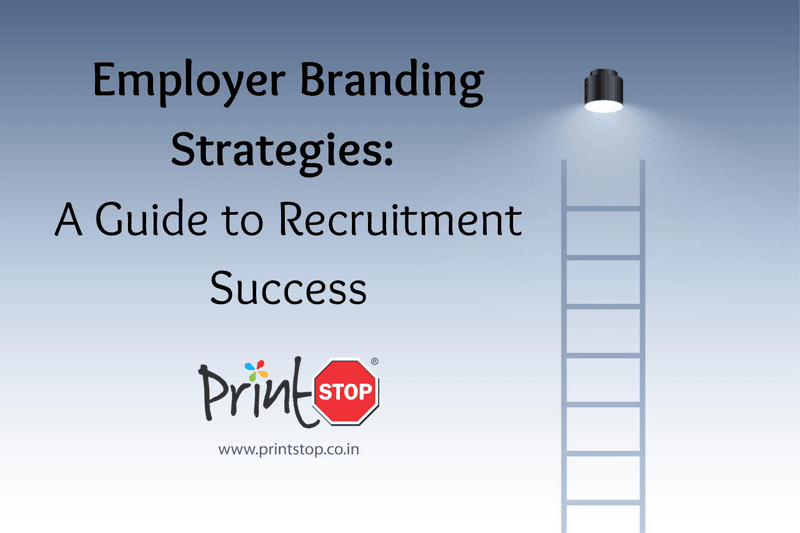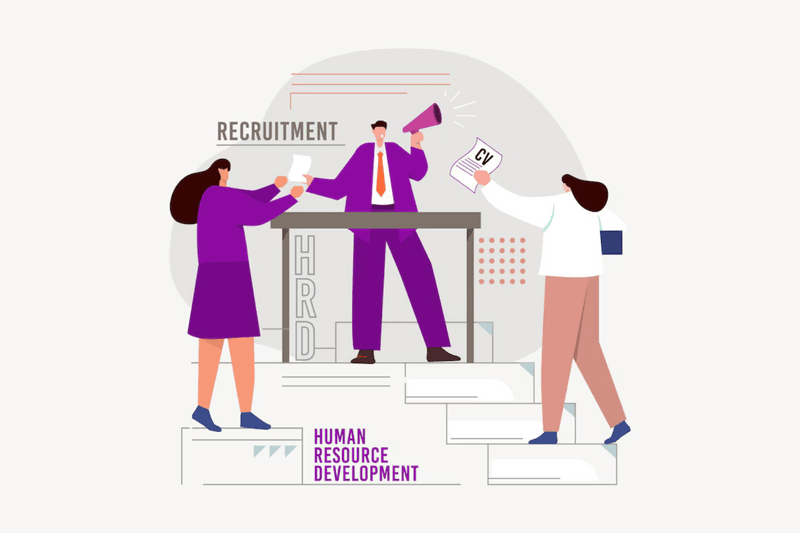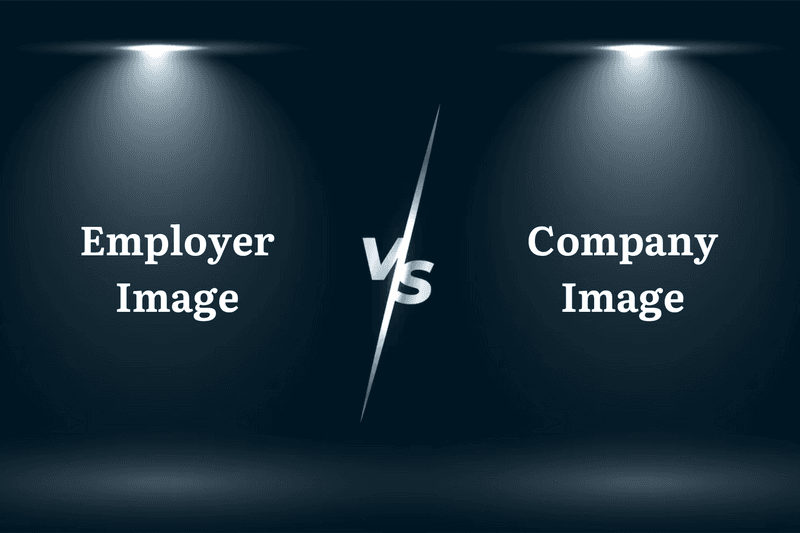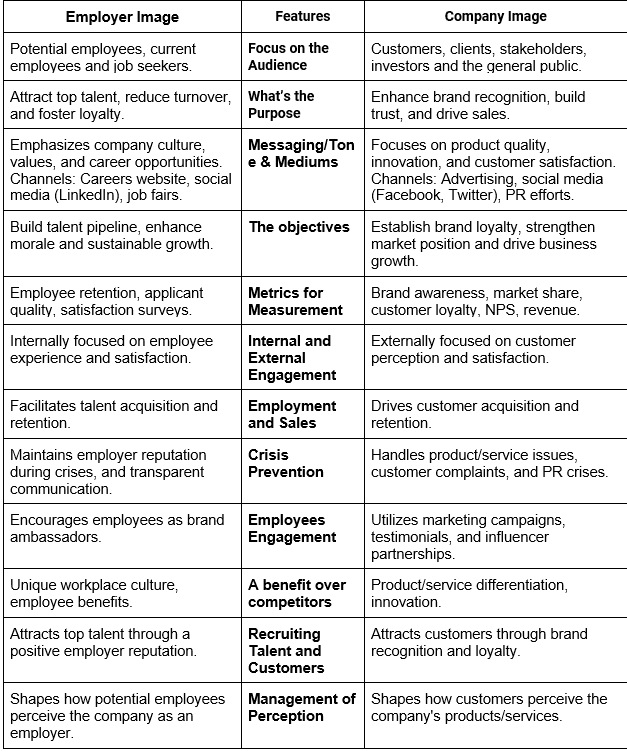Employer Branding Strategies: A Guide to Recruitment Success

In today’s competitive job market, filling positions is not the only priority. Establishing a strong connection with potential and Hard-working employees is equally important. This is where employer branding comes into play.
It shapes the perception of a company by potential hires and is like the personality behind the job adverts and company websites. This blog will take you on a journey into the heart of what is employer branding, why it is important and how it is beneficial for the company.
What is Employer Branding?

Employer branding is about how a company portrays itself to employees and job seekers, containing its values, culture, and employee experiences. Through various channels like websites and social media, companies communicate their unique visions and goals to attract talented Potential employees.
A strong employer brand can increase recruitment, retention, and overall company reputation, while a weak brand may Prevent candidates. Ultimately, it's about shaping the perceptions of candidates and creating a compelling value proposition that sets the organization apart in the talent market. It's about fostering a workplace where employees feel safe, valued, engaged, and proud.
Employer Image vs. Company Image

Company branding, on the other hand, encompasses the overall image and reputation of the organization, including its products, services, and corporate identity, aiming to appeal to customers and stakeholders.
While employer branding targets potential and current employees, company branding targets a broader audience, including customers, investors, and the public.
Both branding strategies are crucial for shaping perceptions and building a strong presence in the market. Together, they create a cohesive narrative that defines the organization's identity and influences its success.

Strategies for Employer Branding

Employer Value Proposition (EVP)

Begin by articulating the unique benefits and attributes that make your company stand out as an employer of choice. Delve into what sets you apart, whether it's your commitment to work-life balance, opportunities for career progression, or a vibrant company culture.
By clearly defining your EVP, you provide prospective candidates with a compelling reason to choose your organisation over others. Remember, it's not just about the job; it's about the entire experience of working for your company.
Take the time to understand what motivates your employees and align your EVP accordingly, ensuring it resonates authentically with your target audience.
Produce Captivating Content

Embrace storytelling as a powerful tool for showcasing your company's values, culture, and mission. Use a variety of media formats, including videos, blog posts, photos, and slideshows, to bring your employer brand to life.
Share authentic stories that resonate with your target audience, highlighting real experiences and achievements within your organisation. Engage with candidates and employees on an emotional level, fostering connections and building trust.
Remember, compelling content isn't just about promoting your company; it's about sharing meaningful narratives that inspire, educate, and entertain. Take the time to craft content that reflects your company's personality and leaves a lasting impression on your audience.
Interact with Employees and Candidates

Foster meaningful interactions with both prospective and current employees, building relationships based on trust and respect. Listen attentively to their needs, concerns, and aspirations, and strive to address them effectively.
Communicate transparently about your company culture, values, and expectations, helping candidates make informed decisions about joining your organisation. Show genuine interest in their career development and well-being, demonstrating your commitment to their success.
Remember, engagement is a two-way street; encourage dialogue and feedback to foster a culture of collaboration and continuous improvement.
Employer Image Promotion on Social Media Sites

Leverage the power of social media platforms, such as LinkedIn, Twitter, and Instagram, to amplify your employer brand. Showcase your company culture, values, and employee experiences through engaging content, including behind-the-scenes glimpses, employee spotlights, and company events.
By actively participating in social conversations and building an authentic online presence, you can attract and engage with potential candidates, nurturing a community of talent around your brand.
Employer Review Sites and Reputation Management

Take proactive steps to manage your company's reputation on employer review sites like Glassdoor and Indeed. Monitor feedback from current and former employees, as well as job seekers, to understand perceptions of your company as an employer.
Respond promptly and transparently to both positive and negative reviews, addressing concerns and highlighting strengths. By actively managing your online reputation, you can cultivate a positive employer brand image and demonstrate your commitment to employee satisfaction and transparency.
Monitor and Manage Online Reputation

Keep a close eye on online conversations and feedback related to your employer brand, proactively addressing any issues or concerns that arise. Monitor review sites, social media channels, and online forums to gauge sentiment and respond promptly to both positive and negative feedback.
Take proactive steps to enhance your online presence, including optimising your company website and social media profiles for search engines. Showcase positive testimonials and endorsements from satisfied employees, highlighting the strengths of your employer brand.
Remember, your online reputation can significantly influence candidates' perceptions of your company, so actively manage it to maintain a positive image.
Measure success and adapt strategies.

Establish key performance indicators (KPIs) to evaluate the effectiveness of your employer branding efforts and track progress over time. Measure metrics such as candidate engagement, employee satisfaction, retention rates, and employer brand awareness to gauge success.
Analyse data and feedback to identify areas for improvement and refine your strategies accordingly. Be agile and adaptable, willing to experiment with new approaches and pivot as needed to achieve your objectives.
Remember, continuous evaluation and adjustment are essential for staying competitive and maximising the impact of your employer branding initiatives.
Investment in Employee Experience

Recognise that the employee journey begins long before they join your organisation and extends far beyond their first day. Invest in creating an environment where employees feel valued, supported, and empowered to thrive.
From providing comprehensive onboarding programmes to offering ongoing training and development opportunities, every interaction shapes the employee experience. Prioritise open communication, foster a sense of belonging, and actively seek feedback to continually improve.
Remember, positive Employee Branding not only enhances retention but also serves as a powerful recruitment tool, as satisfied employees are more likely to recommend your company to others.
Internal Coherence and Support from Leadership

It's vital to ensure that every member of your organisation, from the CEO to entry-level staff, is aligned with the company's values and culture. This internal alignment fosters a sense of unity and authenticity, which is essential for effective employer branding.
Leadership buy-in is crucial; when senior executives actively champion employer branding initiatives, it signals to the entire organisation that these efforts are valued and prioritised.
Development of Candidate Personas

Delve deep into understanding your ideal candidates by developing detailed personas that encapsulate their demographics, preferences, motivations, and career aspirations.
By crafting these candidate personas, you gain insights into what resonates with your target audience, enabling you to tailor your employer branding messages and recruitment strategies effectively. This personalised approach increases the relevance and appeal of your employer brand, attracting the right talent to your organisation.
Why is Employer Branding crucial for hiring purposes?

Talent Attraction
A robust employer brand acts as a powerful magnet for top-tier talent, drawing in individuals who are not only qualified but also resonate with the company's ethos and culture. It establishes your organisation as a desirable destination for prospective employees, enhancing the pool of candidates available for recruitment.
Persistence Power
Beyond its role in recruitment, a strong employer brand contributes significantly to employee retention. When employees feel a strong sense of connection and pride in their workplace, they are more inclined to stay loyal and committed to the organisation. This, in turn, reduces turnover rates and fosters a stable and engaged workforce.
Competitive Advantage

In today's fiercely competitive job market, a compelling employer brand provides a distinct advantage. It distinguishes your organisation from competitors, positioning it as an employer of choice. This competitive edge not only attracts top talent but also enhances the company's reputation and market positioning.
Advocacy of Employees
Employees who feel valued and engaged are natural ambassadors for their organisation. A positive employer brand encourages employee advocacy, with satisfied employees sharing their positive experiences with friends, family, and professional networks. This organic promotion helps to amplify the employer brand and attract talent through word-of-mouth referrals.
Cost Effectiveness
Investing in employer branding yields significant cost efficiencies in the long run. By attracting a higher calibre of candidates and reducing turnover rates, organisations can save on recruitment, onboarding, and training expenses. Additionally, a positive employer brand can lead to improved employee productivity and performance, further enhancing cost efficiency.
Alignment of Cultural Fit

A well-defined employer brand not only attracts talent but also ensures a strong alignment between candidates and the company's culture. Candidates who resonate with the organisation's values and work environment are more likely to thrive and contribute positively. This cultural fit alignment leads to higher job satisfaction, lower turnover, and increased overall organisational effectiveness.
Creative Inspirator
A positive employer brand fosters an environment conducive to innovation and creativity. Engaged and empowered employees feel encouraged to contribute ideas, challenge the status quo, and drive innovation within the organisation.
This innovation catalyst aspect of employer branding fuels continuous improvement and keeps the organisation ahead of the curve in a rapidly evolving business landscape.
In what ways will recruiter branding benefit your company?

Having strong employer branding is essential to attracting top talent that aligns with your company's values and culture. This can help streamline the recruitment process and ensure a motivated workforce that contributes to the success of your organization.
When employees feel proud and committed to their work, it can reduce turnover costs and boost productivity and innovation. Investing in employer branding can also help cultivate a positive workplace culture, enhance your company's reputation, and increase long-term competitiveness.
In short, employer branding humanises your organization and helps create a thriving workplace.
Enhance Employee Engagement
Investing in recruiter branding fosters a sense of pride and purpose among recruitment teams, leading to higher levels of motivation, productivity, and job satisfaction.
Engaged recruiters are more likely to go the extra mile to attract top talent and uphold the company's reputation. Keeping your in-house and remote staff motivated and enthusiastic is a valuable Employee Engagement tactic.
Click here to learn more about Employee Engagement ideas.
Cost Savings

By establishing a strong recruiter brand, organisations can attract higher-quality candidates more efficiently, reducing recruitment costs associated with sourcing and onboarding. This leads to improved cost-effectiveness and resource allocation within the hiring process.
Building a Talent Pipeline
A reputable recruiter brand attracts a steady stream of talented candidates, enabling organisations to build and maintain a robust talent pipeline. This proactive approach to talent acquisition ensures a constant supply of skilled individuals to meet current and future business needs.
Recruiter’s Personal Development
Enhancing recruiter branding involves investing in the professional development of recruitment teams, and providing training, resources, and opportunities for growth. This not only improves the effectiveness of recruiters but also boosts morale and retention within the team.
Increased Trust and Credibility

A strong recruiter brand instils confidence in candidates, reassuring them of the professionalism, integrity, and competence of the recruitment team. This trust and credibility facilitate smoother candidate interactions and enhance the overall recruitment experience.
Attracting Passive Candidates
An established recruiter brand has the allure to attract passive candidates who may not actively seek new opportunities. By positioning themselves as reputable and desirable employers, organisations can entice passive talent to consider career opportunities within their ranks.
Retention of Top Talent

A positive recruiter brand transcends the hiring process, encompassing the entire employee lifecycle, including retention endeavours. Upholding a positive employer brand ethos fosters a supportive and fulfilling work environment, curbing turnover rates and retaining top talent.
Additionally, robust rewards and recognition programmes further incentivise and motivate employees, solidifying their commitment to the organisation. Let's nurture a culture where talent not only thrives but flourishes, ensuring sustained success for your company.
Adaptability to Changing Market Conditions
Organisations with a strong recruiter brand are better equipped to navigate evolving market dynamics and talent trends. Recruiters who are attuned to market changes can adjust their strategies and approaches accordingly, ensuring continued success in attracting and retaining top talent.
Differentiation in a Competitive Market
In a crowded job market, a distinctive recruiter brand sets organisations apart from competitors, making them more attractive to candidates. By showcasing unique selling points and employer value propositions, recruiters can stand out in a competitive landscape and attract the best talent available.
How Visuals play an important role in Employer Branding

First Impressions
Visuals make an instant impact, shaping candidates' perceptions. Visuals wield immediate influence, moulding candidates' perceptions. Standees, banners, and other visual elements with the brand’s style, logo and name, craft a captivating identity of your company, piquing interest from potential hires.
Tailored onboarding kits extend a warm welcome to recruits. Construct a compelling visual narrative, resonating authentically with your audience, and enhancing your employer brand's stature.
Brand Identity
Consistent visual branding reinforces the company's identity and values, establishing trust and recognition. Logos, colours, and design elements convey a distinct brand personality, helping to differentiate the organisation in the minds of candidates.
Showcasing Company Culture

Visuals offer a window into the company's ethos, workplace environment, and team dynamics. Authentic images and videos provide insight into the company culture, attracting candidates who resonate with its values and way of working.
Engagement and Connection
Visual content captivates and connects with candidates on an emotional level, driving engagement and interaction. Compelling visuals evoke curiosity and interest, prompting candidates to explore job opportunities and engage with the employer brand further.
Differentiation
In a competitive job market, visually appealing branding sets organisations apart from competitors and positions them as desirable employers. Unique and creative visuals help companies stand out and leave a lasting impression on candidates, increasing their likelihood of applying for roles.
Emotional Appeal
Visuals have the power to evoke emotions and resonate with candidates on a deeper level. By showcasing authentic and relatable imagery, companies can evoke feelings of trust, belonging, and excitement, fostering an emotional connection with potential candidates.
Social Sharing and Virality

Visually appealing content is highly shareable on social media platforms, increasing the reach and virality of employer branding efforts. Engaging visuals encourage candidates to share job postings, company updates, and employee stories with their networks, amplifying the employer brand's visibility and attracting a wider audience.
Accessibility and Inclusivity
Visuals can enhance accessibility and inclusivity in employer branding by using diverse imagery that reflects the company's commitment to diversity and inclusion. Thoughtfully designed visuals ensure that all candidates feel represented and included, regardless of background or identity.
Conclusion

Employer branding is not merely about filling positions but about fostering meaningful connections with potential employees. It serves as the personality behind job adverts and company websites, shaping perceptions and attracting top talent.
By authentically portraying the company's values, culture, and employee experiences, employer branding enhances recruitment success, retention rates, and overall company reputation. Through strategies such as defining an employer value proposition, investing in employee experience, and leveraging compelling visuals, organisations can create a compelling narrative that resonates with candidates and sets them apart in the talent market.
Ultimately, employer branding humanises the organisation, creating a workplace where employees feel valued, engaged, and proud. By prioritising authenticity and empathy, businesses can build a strong employer brand that drives recruitment success and contributes to long-term growth and success.